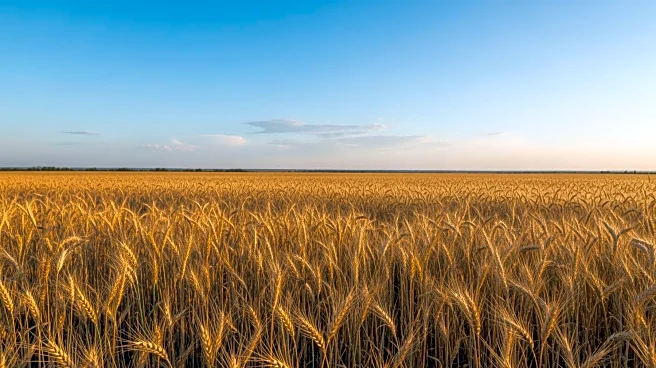What's Happening?
China has announced plans to increase its purchases of U.S. soybeans and sorghum, providing a boost to Kansas farmers who have been facing high input costs and trade tariff challenges. Kaleb Little, CEO
of the Kansas Soybean Association, highlighted that China, traditionally the largest buyer of U.S. soybeans, had canceled all purchases this year due to trade tariffs. However, recent trade agreements indicate China will purchase 25 million metric tons of soybeans annually from 2026 to 2028, with 12 million metric tons to be bought this year. Additionally, China has pledged to resume sorghum purchases, which could help Kansas farmers cover production costs. Kansas is the leading sorghum-producing state, with a significant economic impact. However, the ongoing government shutdown has delayed federal agricultural reports, which are crucial for farmers' decision-making.
Why It's Important?
The commitment from China to purchase more U.S. crops is significant for Kansas farmers, who have been struggling with the economic impact of trade tariffs and high production costs. The increased purchases could stabilize prices and provide financial relief. The resumption of sorghum purchases is particularly beneficial for Kansas, the top sorghum-producing state. However, the lack of federal agricultural reports due to the government shutdown poses a challenge, as these reports are essential for farmers to make informed decisions about crop production and sales. The delay in data could lead to uncertainty and market volatility, affecting farmers' planning and financial stability.
What's Next?
Farmers and industry stakeholders will be closely monitoring China's purchasing activity in the coming months to assess the impact on crop prices and sales. The resolution of the government shutdown is critical to resume the flow of agricultural data, which will help farmers make informed decisions. The December agricultural report, if delayed, could heighten uncertainty in the market. Stakeholders will also be watching for any further trade negotiations or policy changes that could affect international crop sales.
Beyond the Headlines
The situation highlights the vulnerability of U.S. agriculture to international trade policies and the importance of reliable government data for the agricultural sector. The ongoing trade tensions and government shutdown underscore the need for diversified markets and robust domestic policies to support farmers. The developments could lead to long-term shifts in trade relationships and agricultural practices, as farmers seek to mitigate risks associated with international trade dependencies.








